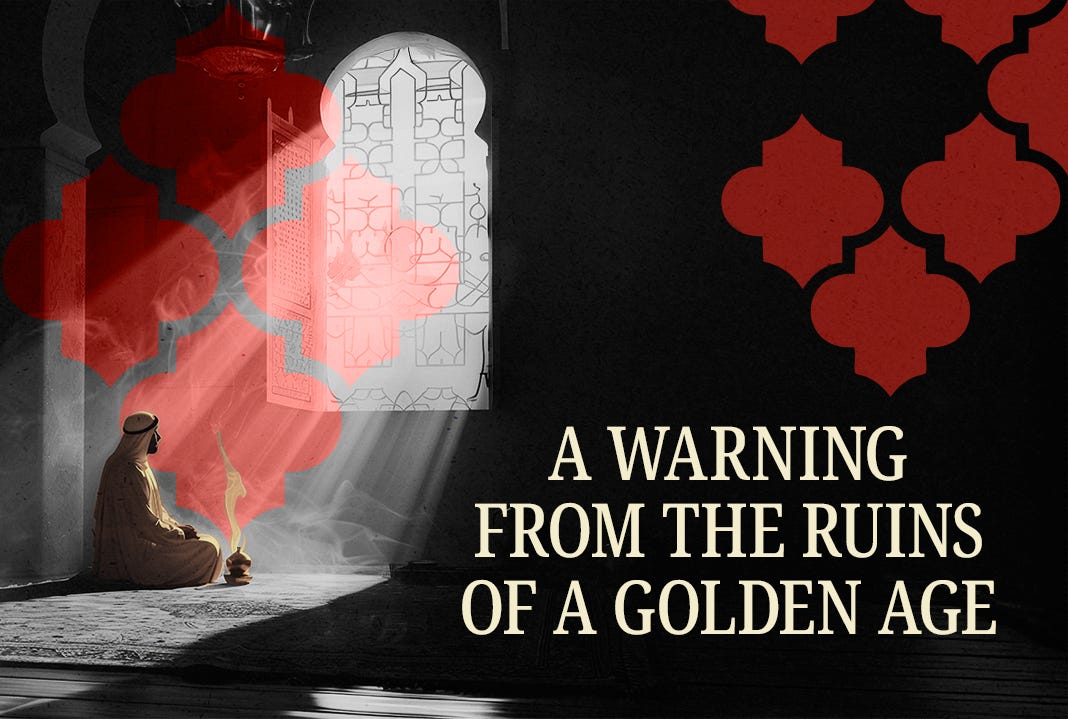A Warning from the Ruins of a Golden Age
History shows that every society that silences its thinkers signs its own death warrant
As someone who has witnessed the long-term damage caused by the suppression of intellectual life in the Arab world, I view current trends in the West with growing concern. History is not subtle on this point: societies that stifle inquiry, punish dissent, or subordinate reason to ideology do not endure. The moment a culture turns against its own thinkers, it begins to erode from within. Civilizations that suppress intellectual freedom do not survive. They might rage against heresy, censor “dangerous” ideas, and exile their dissidents. But eventually, they collapse—hollowed out from within.
There was a time, not so long ago in historical terms, when Baghdad and Cordoba were the intellectual centers of the world. Arab and Muslim scholars pioneered medicine, mathematics, astronomy, and philosophy. These were not just randomized bursts of brilliance; they formed the engine of human progress for centuries.
Then came the counterrevolution. In the 11th century, the theologian Abu Hamid al-Ghazali published The Incoherence of the Philosophers, a sweeping attack on rationalist inquiry. With that single work, he helped turn the tide against thinkers like Ibn Sina (Avicenna) and Al-Farabi—giants of logic, science, and metaphysics. The rationalist school was branded heretical. Revelation trumped reason. And so began the implosion of once great civilizations.
The Andalusian polymath Ibn Rushd (Averroes) tried to fight back, famously defending reason in The Incoherence of the Incoherence. But he lost. And with him, the Islamic world lost its intellectual edge. It passed the torch to Europe—and never took it back.
Europe, too, once went dark. After Rome fell, the continent descended into centuries of intellectual stifling. The Church persecuted heretics, criminalized curiosity, and policed thought with the threats of pyres and gallows. Bruno was burned at the stake. Galileo silenced. And the pursuit of truth was reframed as a threat to moral order.
Ironically, it was through translations of the very Muslim philosophers condemned by the Islamic world that Europe began to reawaken. The Renaissance was not a divine miracle. It was the rediscovery of the idea that reason, not doctrine, drives human flourishing.
Civilizations across time have repeated this fatal mistake. Under the Qing dynasty, China’s imperial court executed scholars for misinterpreting Confucian texts. Innovation became dangerous; conformity, sacred. The result? China missed the Industrial Revolution and became a subject of Western colonization.
In the Soviet Union, Stalin decimated scientific disciplines he deemed ideologically impure. Geneticists were imprisoned, physicists vanished into thin air, and entire fields were replaced by pseudoscientific dogma. The cost was measured in lives lost, knowledge buried, and a superpower that ultimately collapsed under the weight of its own ignorance.
The throughline is unmistakable: the moment a civilization wages war on its thinkers, its fate is sealed. Today, I see flickers of that same fire on both ends of the Western ideological spectrum.
From the right, we witness a performative assault on science: climate denialism, anti-vaccine movements, and conspiracy theories masquerading as contrarianism. But it is a mistake to think the threat comes only from conservative populism.
On the left, a new dogma has emerged—ideologically rigid and allergic to dissent. It elevates narrative over data, feeling over fact. Complex subjects like gender, biology, crime, and public health are increasingly deemed off-limits for rigorous debate. Academics who question the new orthodoxy risk cancellation, not engagement. To challenge is to betray.
Intellectual freedom is under threat across the spectrum. The language is different—“cancel culture” on one side, “disinformation” on the other—but the effect is the same: fear, self-censorship, and a profound erosion of public trust in expertise.
When facts become negotiable and inquiry is seen as aggression, a society does not progress. It regresses—fast.
This is personal. I grew up in a world that once led humanity in thought and discovery. And I watched as that same world turned its back on reason. Books were banned. Scientists were treated as subversives. The safest intellectual position was silence.
I don’t want to see the West, still the global standard for science, innovation, and open discourse, follow the same path.
Because if the West falls intellectually, the consequences will not stop at its shores. Much of the world still relies on Western leadership in everything from medicine to technology to human rights. Its self-sabotage would be a catastrophe for all of us.
This is not a plea for false balance. It is a plea for reason—for the stubborn defense of open debate, scientific rigor, and the freedom to question even the most sacred of assumptions.
A society that cannot tolerate dangerous questions cannot survive dangerous times. The moment it begins silencing its own thinkers—whether through book bans, ideological purges, or online mobs—it begins writing its own obituary.
History doesn’t just warn us. It begs us: Don’t do this again.
Middle East Uncovered is powered by Ideas Beyond Borders. The views expressed in Middle East Uncovered are those of the authors and do not necessarily reflect the views of Ideas Beyond Borders.



Terrific analysis. Well written. Logical. Fair warning.
Ahmed, thank you for this. I never thought about this from all these different geographical angles.